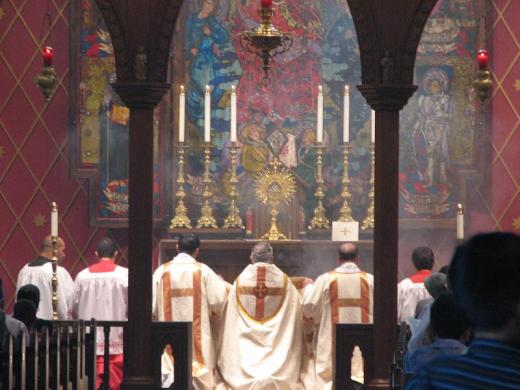I come from a liturgical tradition (Anglicanism). In this tradition there are many ways we mark the passage of time. We have holidays, liturgical season, feast days, etc. One of the most important, if underutilized, ones is the Daily Office.
The idea of ritualization of time goes back at least as far as Exodus 29:38-42, where God instructs Moses on how to make daily offerings. The Didache (written in the late First Century) gives instruction on which days to fast on and on how to recite the Lord’s Prayer at least 3 times per day. By the time the New Testament Canon was established in the Fourth Century, there was a set pattern of prayers throughout the day. When St. Benedict established his monastic system in the seventh century, it revolved around the regular schedule of prayers throughout the day. The examples continue to the present day where we now have millions of Christians (primarily in Roman, Anlgican, and Orthodox traditions) who pray in regular patterns throughout the day, with many of them using the Daily Office.
The core concept of the Office is that intentional and structured prayer should take place throughout the day. We live in a society where many of us feel that our prayer time interrupts our work. The Office teaches that this is thinking backwards. Periods of work actually interrupt our time of prayer. The rhythm of our day is not to be dictated by what day of the week it is, or what our work schedule calls for. It is built around prayer, which then anchors everything else we do.
Use of the Daily Office means that your prayer is driven by Scripture, which takes you deeper in to God’s Word as well as God’s Will. It reorients our perspective and helps us avoid the trap of making prayer time a shopping list of our wants, desires, and needs.
The most common criticism of the Office is that it is too regimented or ritualized. This is merely an excuse, because humans are habitual and ritualistic by nature. Whether it is morning routines that cannot be altered, playoff beards for NHL teams, or choosing the same seat every time we go to church (or school), it should be noted that rituals are very important to us. It is just that some rituals are hard because our short attention spans make it hard to focus on them. Sacred rituals are ones that invite us in and teach us new things over the course of time, often years.
What are the key components of the Daily Office? It varies somewhat with each tradition, but it revolves around a thorough reading of the Psalms, readings from other Books of the Bible, and prayer. Though an Anglican, I pray the Roman Catholic Liturgy of the Hours, which uses a much more extensive set of readings from Scripture, as well as writings from great Christians from the past.
In The Liturgy of the Hours, the entire Book of Psalms is read every 28 days. The Psalms are neglected by many people because they are not cited heavily in defining doctrine. We each have a few favorites, but most of the 150 Psalms are relatively unknown. By working through the whole book each month, you slowly learn the unique message of each Psalm and make their prayer your own prayer. More than half of all Psalms can be categorized as laments and this is very helpful in times of struggle or fear because they can give voice to things that you may not be able to find the words for.
In addition to the Psalms, there are readings from the rest of Scripture. In the Office of Readings, which is read first thing in the morning, entire books of the Bible are read over the course of days or weeks. Additionally, there are readings from great Christians from the past, sometimes as commentary on the reading just completed, other times on key aspects to living a holy life. In addition to this, there are three readings that are recited every day (which automatically become memorized within the first year of praying the Office!); Psalm 95, read in the Office of Readings, the Nunc Dimittis (the Song of Simeon from Luke 2:29-32) in the morning and the Magnificat (the Song of Mary found in Luke 1:46-55) in the evening.
A consistent discipline of praying the Daily Office cannot help but impact the one who prays it. Days come to be seen in terms of what prayer comes next. Life is lived to the rhythm of the texts and the poetry of the Psalms can occupy your mind throughout the trials of each day. It can serve as a reminder that your Christian live can still be lived in the context of “praying without ceasing” even when your life is lived in the midst of a secular and unbelieving culture.
I would encourage you to try it … but I would ask you not to pray for a day and then decide if it is efficacious. Pray it every day for 30 days before deciding! The Daily Office is a cultivated discipline, not an instantaneous one.









